MERCEDES-BENZ G-Class 2015 W463 Owner's Manual
Manufacturer: MERCEDES-BENZ, Model Year: 2015, Model line: G-Class, Model: MERCEDES-BENZ G-Class 2015 W463Pages: 350, PDF Size: 6.44 MB
Page 111 of 350
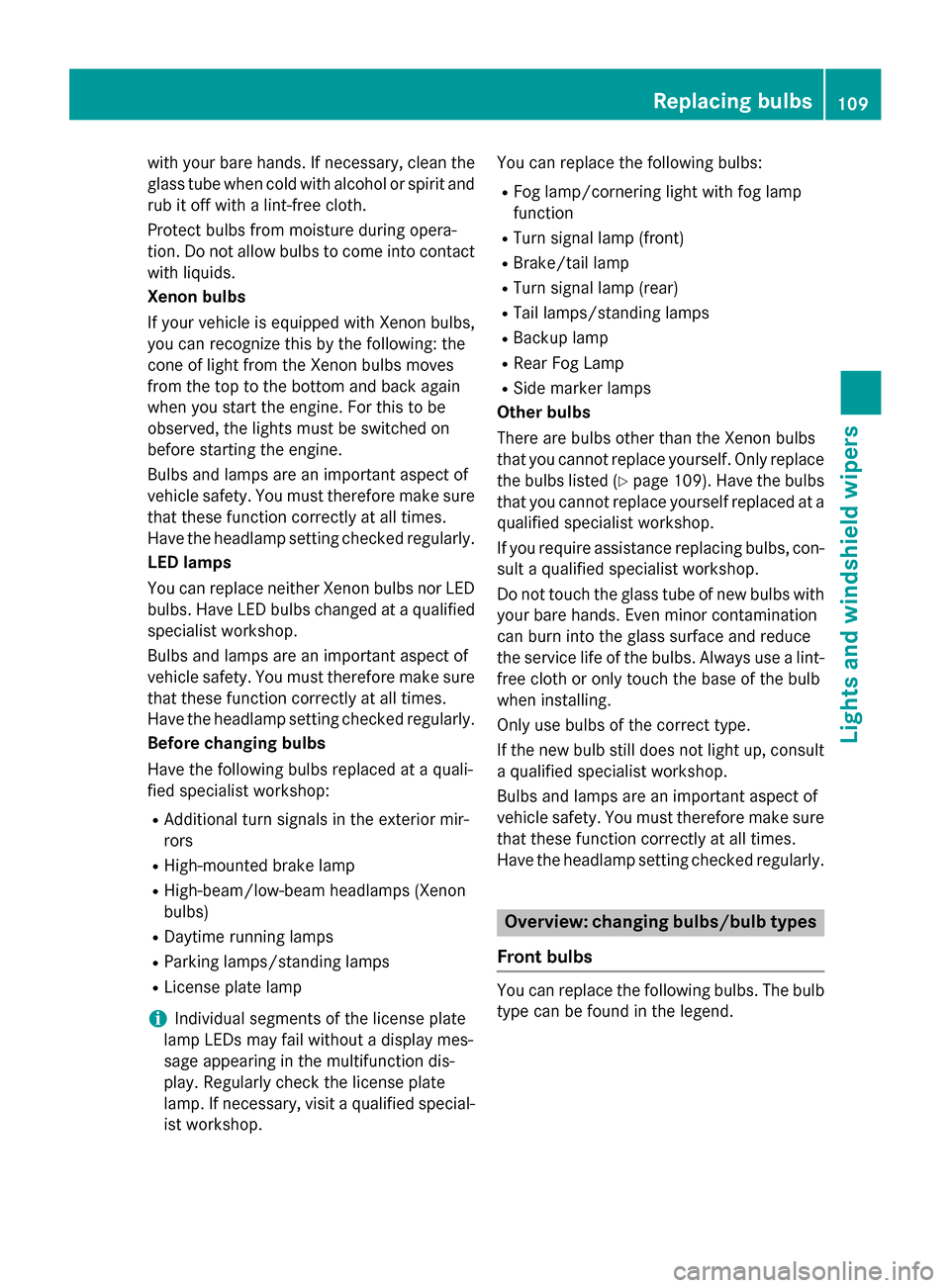
with your bare hands. If necessary, clean the
glass tube when cold with alcohol or spirit and
rub it off with a lint-free cloth.
Protect bulbs from moisture during opera-
tion. Do not allow bulbs to come into contact
with liquids.
Xenon bulbs
If your vehicle is equipped with Xenon bulbs,
you can recognize this by the following: the
cone of light from the Xenon bulbs moves
from the top to the bottom and back again
when you start the engine. For this to be
observed, the lights must be switched on
before starting the engine.
Bulbs and lamps are an important aspect of
vehicle safety. You must therefore make sure that these function correctly at all times.
Have the headlamp setting checked regularly.
LED lamps
You can replace neither Xenon bulbs nor LED
bulbs. Have LED bulbs changed at a qualified specialist workshop.
Bulbs and lamps are an important aspect of
vehicle safety. You must therefore make sure
that these function correctly at all times.
Have the headlamp setting checked regularly.
Before changing bulbs
Have the following bulbs replaced at a quali-
fied specialist workshop:
R Additional turn signals in the exterior mir-
rors
R High-mounted brake lamp
R High-beam/low-beam headlamps (Xenon
bulbs)
R Daytime running lamps
R Parking lamps/standing lamps
R License plate lamp
i Individual segments of the license plate
lamp LEDs may fail without a display mes-
sage appearing in the multifunction dis-
play. Regularly check the license plate
lamp. If necessary, visit a qualified special-
ist workshop. You can replace the following bulbs:
R Fog lamp/cornering light with fog lamp
function
R Turn signal lamp (front)
R Brake/tail lamp
R Turn signal lamp (rear)
R Tail lamps/standing lamps
R Backup lamp
R Rear Fog Lamp
R Side marker lamps
Other bulbs
There are bulbs other than the Xenon bulbs
that you cannot replace yourself. Only replace the bulbs listed (Y page 109). Have the bulbs
that you cannot replace yourself replaced at a
qualified specialist workshop.
If you require assistance replacing bulbs, con-
sult a qualified specialist workshop.
Do not touch the glass tube of new bulbs with
your bare hands. Even minor contamination
can burn into the glass surface and reduce
the service life of the bulbs. Always use a lint- free cloth or only touch the base of the bulb
when installing.
Only use bulbs of the correct type.
If the new bulb still does not light up, consult a qualified specialist workshop.
Bulbs and lamps are an important aspect of
vehicle safety. You must therefore make sure
that these function correctly at all times.
Have the headlamp setting checked regularly. Overview: changing bulbs/bulb types
Front bulbs You can replace the following bulbs. The bulb
type can be found in the legend. Replacing bulbs
109Lights and windshield wipers Z
Page 112 of 350
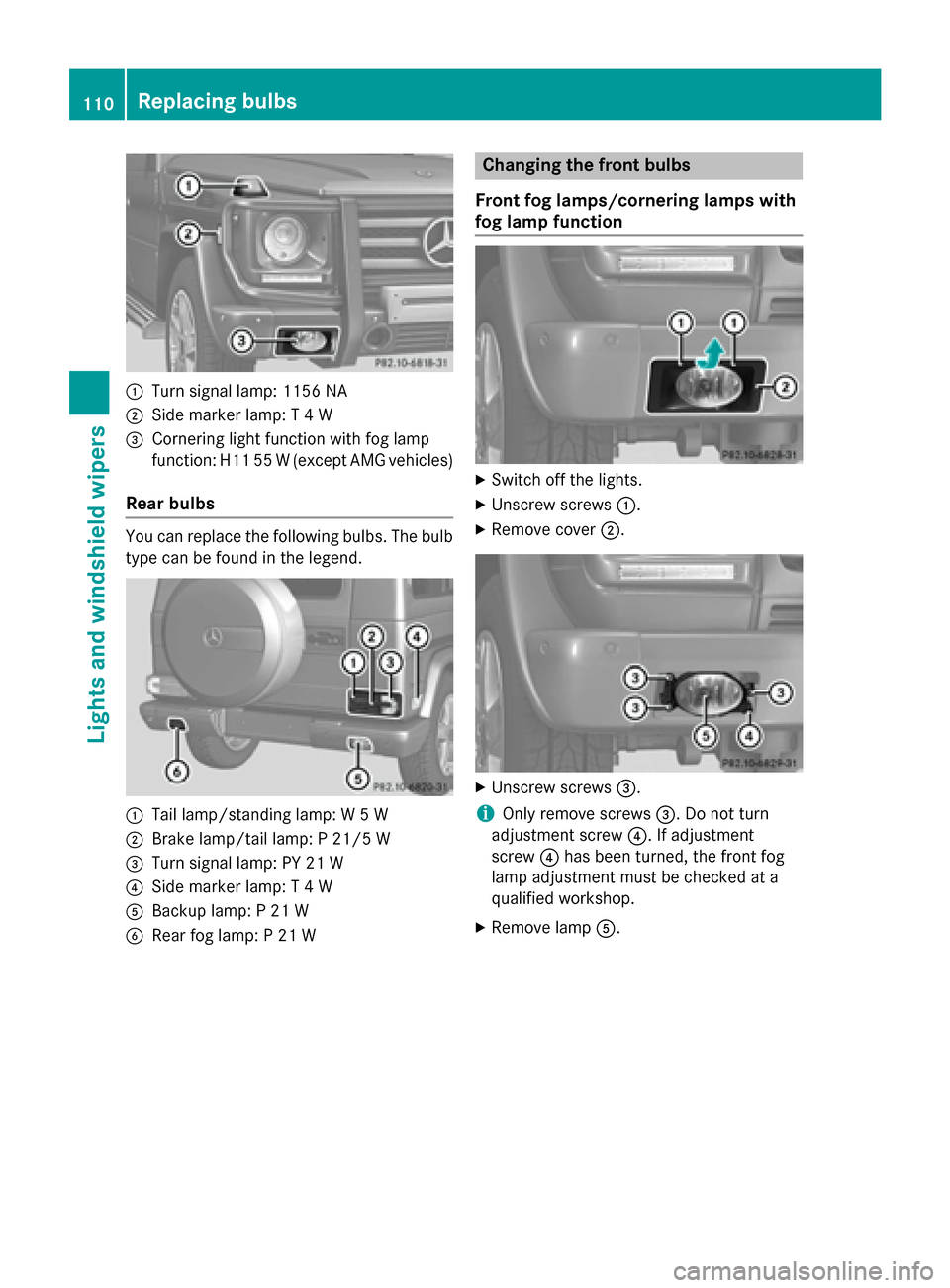
:
Turn signal lamp: 1156 NA
; Side marker lamp: T 4 W
= Cornering light function with fog lamp
function: H11 55 W (except AMG vehicles)
Rear bulbs You can replace the following bulbs. The bulb
type can be found in the legend. :
Tail lamp/standing lamp: W 5 W
; Brake lamp/tail lamp: P 21/5 W
= Turn signal lamp: PY 21 W
? Side marker lamp: T 4 W
A Backup lamp: P 21 W
B Rear fog lamp: P 21 W Changing the front bulbs
Front fog lamps/cornering lamps with
fog lamp function X
Switch off the lights.
X Unscrew screws :.
X Remove cover ;. X
Unscrew screws =.
i Only remove screws
=. Do not turn
adjustment screw ?. If adjustment
screw ?has been turned, the front fog
lamp adjustment must be checked at a
qualified workshop.
X Remove lamp A.110
Replacing bulbsLights and windshield wipers
Page 113 of 350
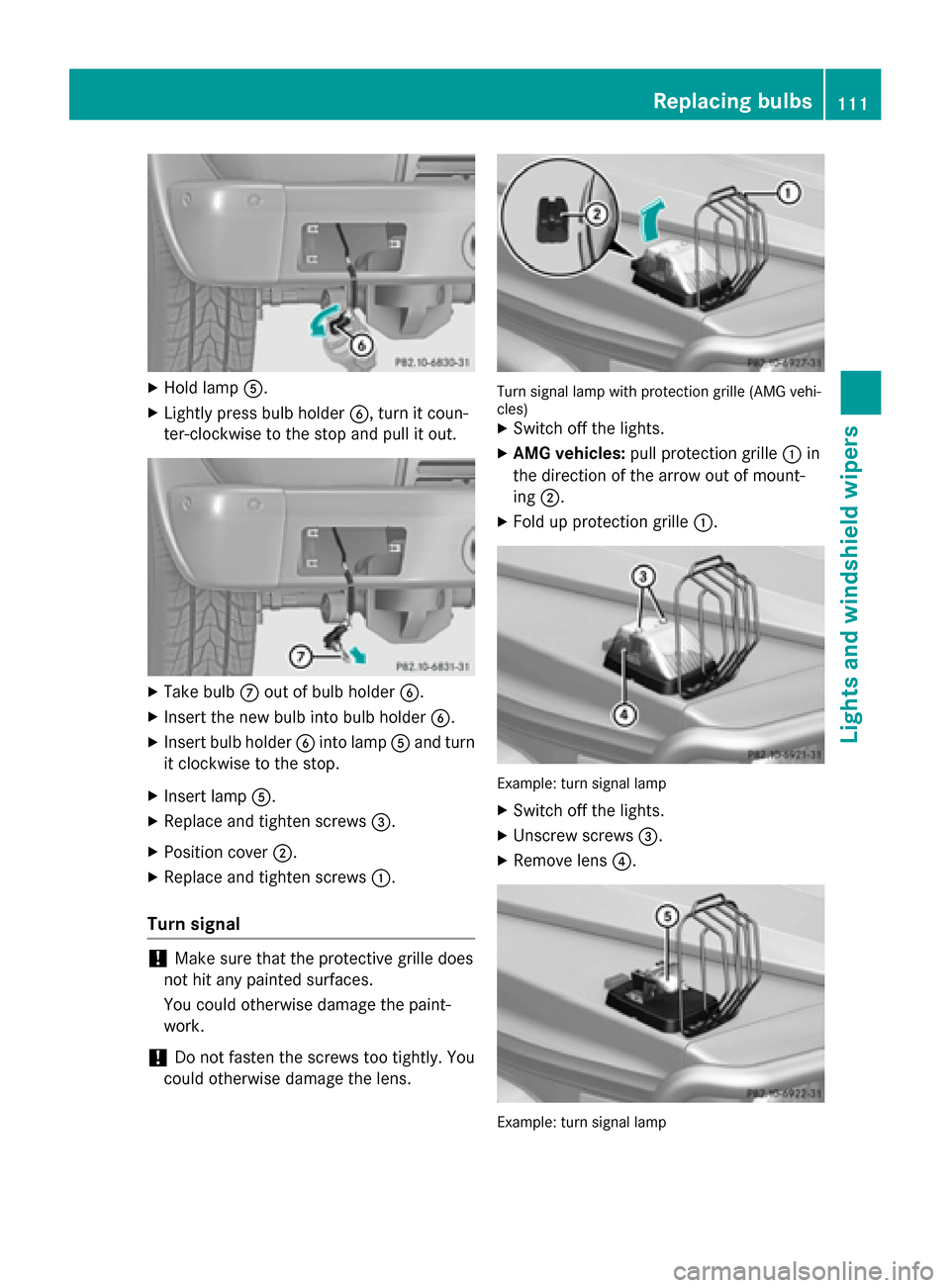
X
Hold lamp A.
X Lightly press bulb holder B, turn it coun-
ter-clockwise to the stop and pull it out. X
Take bulb Cout of bulb holder B.
X Insert the new bulb into bulb holder B.
X Insert bulb holder Binto lamp Aand turn
it clockwise to the stop.
X Insert lamp A.
X Replace and tighten screws =.
X Position cover ;.
X Replace and tighten screws :.
Turn signal !
Make sure that the protective grille does
not hit any painted surfaces.
You could otherwise damage the paint-
work.
! Do not fasten the screws too tightly. You
could otherwise damage the lens. Turn signal lamp with protection grille (AMG vehi-
cles)
X Switch off the lights.
X AMG vehicles: pull protection grille :in
the direction of the arrow out of mount-
ing ;.
X Fold up protection grille :. Example: turn signal lamp
X Switch off the lights.
X Unscrew screws =.
X Remove lens ?. Example: turn signal lamp Replacing bulbs
111Lights and windshield wipers Z
Page 114 of 350
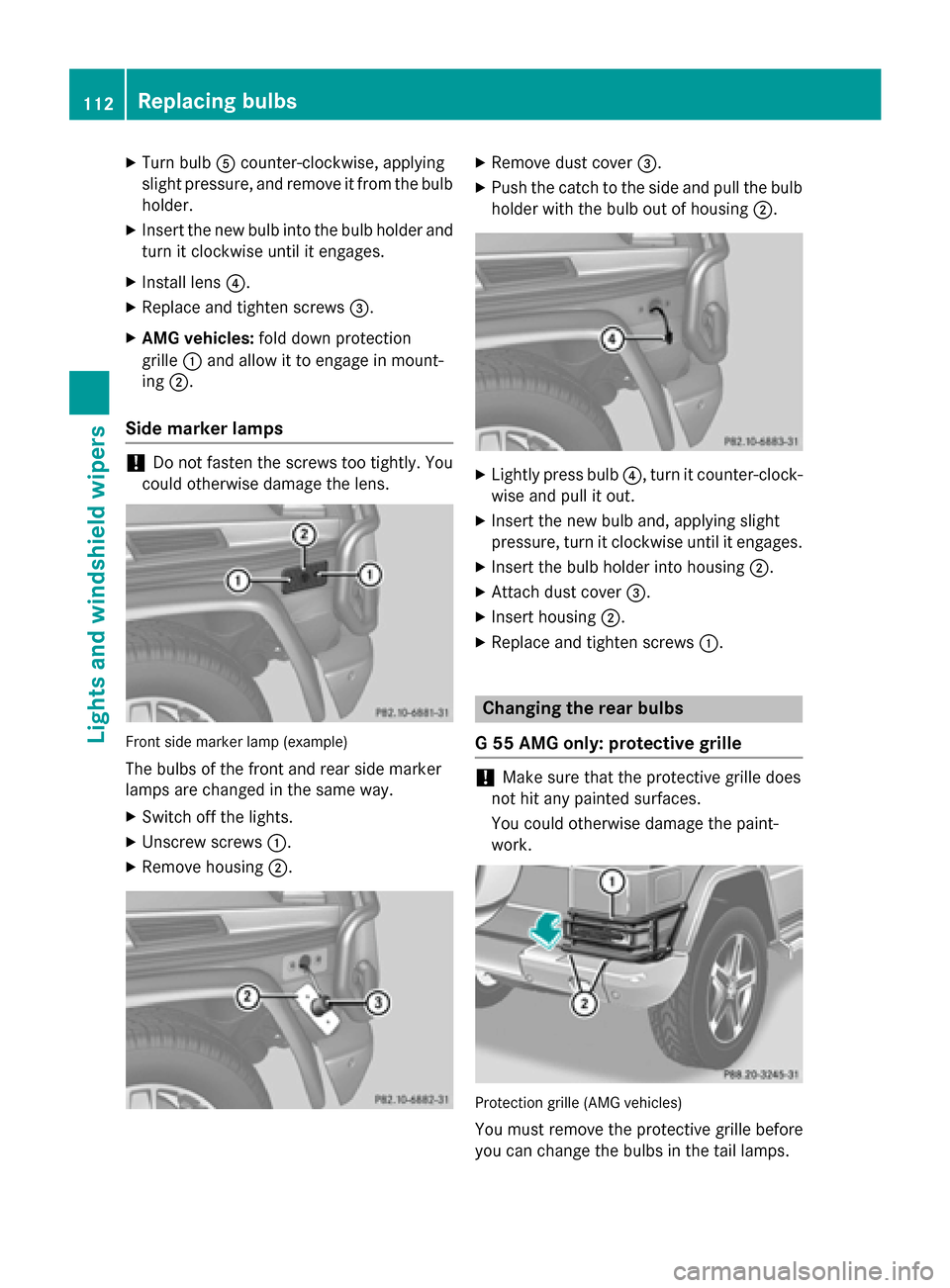
X
Turn bulb Acounter-clockwise, applying
slight pressure, and remove it from the bulb holder.
X Insert the new bulb into the bulb holder and
turn it clockwise until it engages.
X Install lens ?.
X Replace and tighten screws =.
X AMG vehicles: fold down protection
grille :and allow it to engage in mount-
ing ;.
Side marker lamps !
Do not fasten the screws too tightly. You
could otherwise damage the lens. Front side marker lamp (example)
The bulbs of the front and rear side marker
lamps are changed in the same way.
X Switch off the lights.
X Unscrew screws :.
X Remove housing ;. X
Remove dust cover =.
X Push the catch to the side and pull the bulb
holder with the bulb out of housing ;. X
Lightly press bulb ?, turn it counter-clock-
wise and pull it out.
X Insert the new bulb and, applying slight
pressure, turn it clockwise until it engages.
X Insert the bulb holder into housing ;.
X Attach dust cover =.
X Insert housing ;.
X Replace and tighten screws :. Changing the rear bulbs
G 55 AMG only: protective grille !
Make sure that the protective grille does
not hit any painted surfaces.
You could otherwise damage the paint-
work. Protection grille (AMG vehicles)
You must remove the protective grille before
you can change the bulbs in the tail lamps. 112
Replacing bulbsLights and windshield wipers
Page 115 of 350
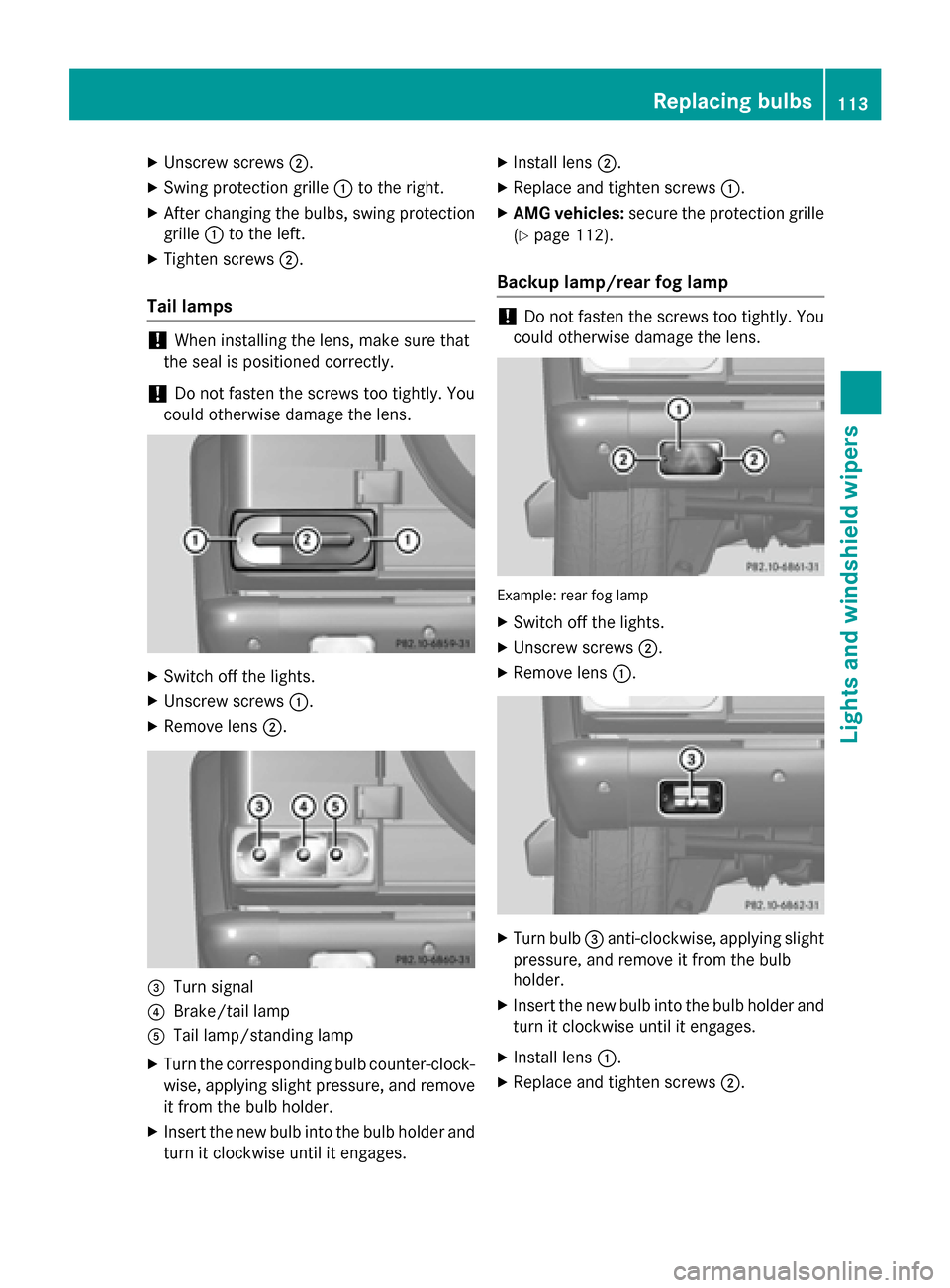
X
Unscrew screws ;.
X Swing protection grille :to the right.
X After changing the bulbs, swing protection
grille :to the left.
X Tighten screws ;.
Tail lamps !
When installing the lens, make sure that
the seal is positioned correctly.
! Do not fasten the screws too tightly. You
could otherwise damage the lens. X
Switch off the lights.
X Unscrew screws :.
X Remove lens ;. =
Turn signal
? Brake/tail lamp
A Tail lamp/standing lamp
X Turn the corresponding bulb counter-clock-
wise, applying slight pressure, and remove
it from the bulb holder.
X Insert the new bulb into the bulb holder and
turn it clockwise until it engages. X
Install lens ;.
X Replace and tighten screws :.
X AMG vehicles: secure the protection grille
(Y page 112).
Backup lamp/rear fog lamp !
Do not fasten the screws too tightly. You
could otherwise damage the lens. Example: rear fog lamp
X Switch off the lights.
X Unscrew screws ;.
X Remove lens :. X
Turn bulb =anti-clockwise, applying slight
pressure, and remove it from the bulb
holder.
X Insert the new bulb into the bulb holder and
turn it clockwise until it engages.
X Install lens :.
X Replace and tighten screws ;. Replacing bulbs
113Lights and windshield wipers Z
Page 116 of 350
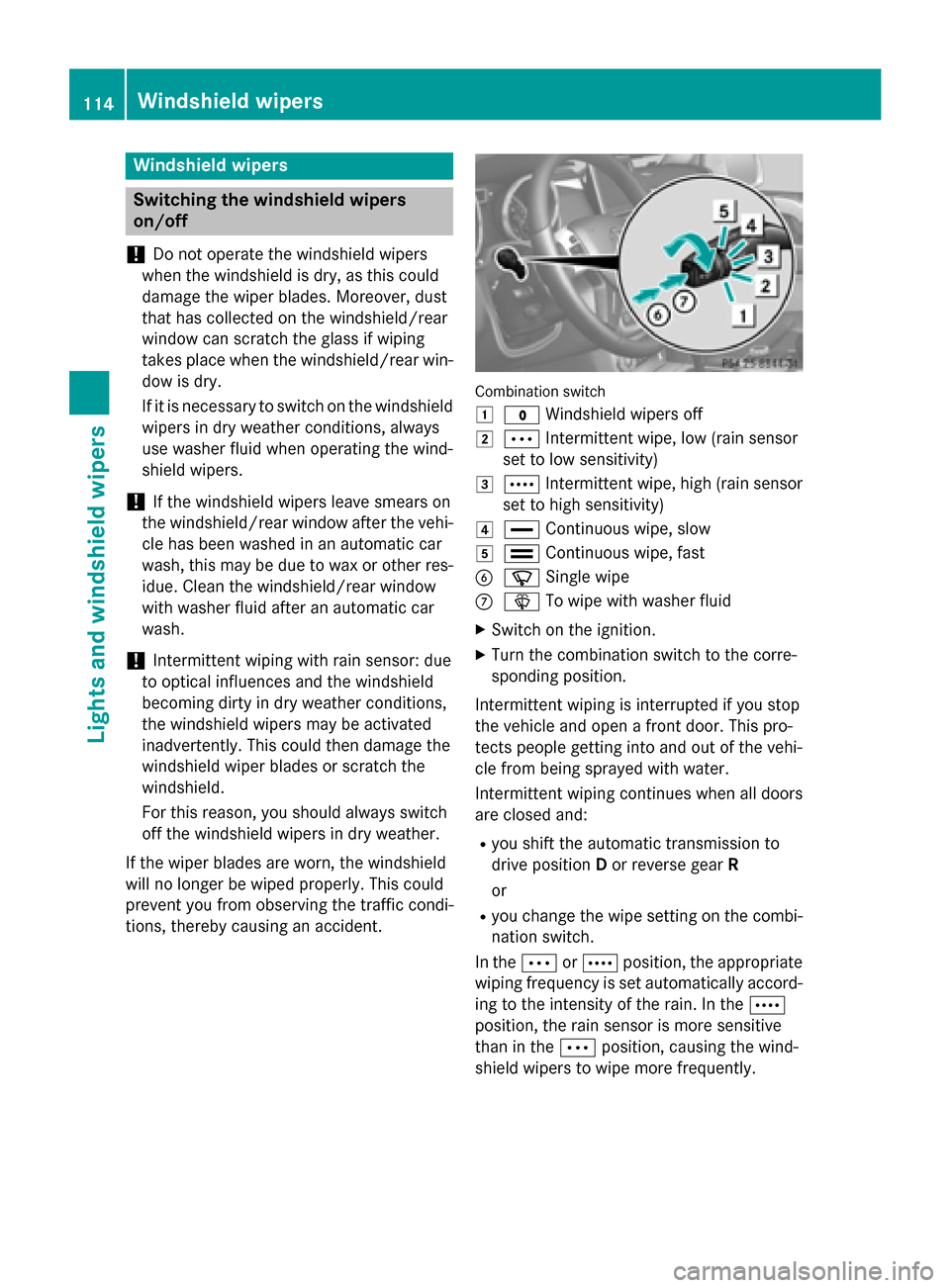
Windshield wipers
Switching the windshield wipers
on/off
! Do not operate the windshield wipers
when the windshield is dry, as this could
damage the wiper blades. Moreover, dust
that has collected on the windshield/rear
window can scratch the glass if wiping
takes place when the windshield/rear win- dow is dry.
If it is necessary to switch on the windshield
wipers in dry weather conditions, always
use washer fluid when operating the wind-
shield wipers.
! If the windshield wipers leave smears on
the windshield/rear window after the vehi- cle has been washed in an automatic car
wash, this may be due to wax or other res-
idue. Clean the windshield/rear window
with washer fluid after an automatic car
wash.
! Intermittent wiping with rain sensor: due
to optical influences and the windshield
becoming dirty in dry weather conditions,
the windshield wipers may be activated
inadvertently. This could then damage the
windshield wiper blades or scratch the
windshield.
For this reason, you should always switch
off the windshield wipers in dry weather.
If the wiper blades are worn, the windshield
will no longer be wiped properly. This could
prevent you from observing the traffic condi-
tions, thereby causing an accident. Combination switch
1
$ Windshield wipers off
2 Ä Intermittent wipe, low (rain sensor
set to low sensitivity)
3 Å Intermittent wipe, high (rain sensor
set to high sensitivity)
4 ° Continuous wipe, slow
5 ¯ Continuous wipe, fast
B í Single wipe
C î To wipe with washer fluid
X Switch on the ignition.
X Turn the combination switch to the corre-
sponding position.
Intermittent wiping is interrupted if you stop
the vehicle and open a front door. This pro-
tects people getting into and out of the vehi-
cle from being sprayed with water.
Intermittent wiping continues when all doors
are closed and:
R you shift the automatic transmission to
drive position Dor reverse gear R
or
R you change the wipe setting on the combi-
nation switch.
In the ÄorÅ position, the appropriate
wiping frequency is set automatically accord-
ing to the intensity of the rain. In the Å
position, the rain sensor is more sensitive
than in the Äposition, causing the wind-
shield wipers to wipe more frequently. 114
Windshield wipersLights and windshield wipers
Page 117 of 350
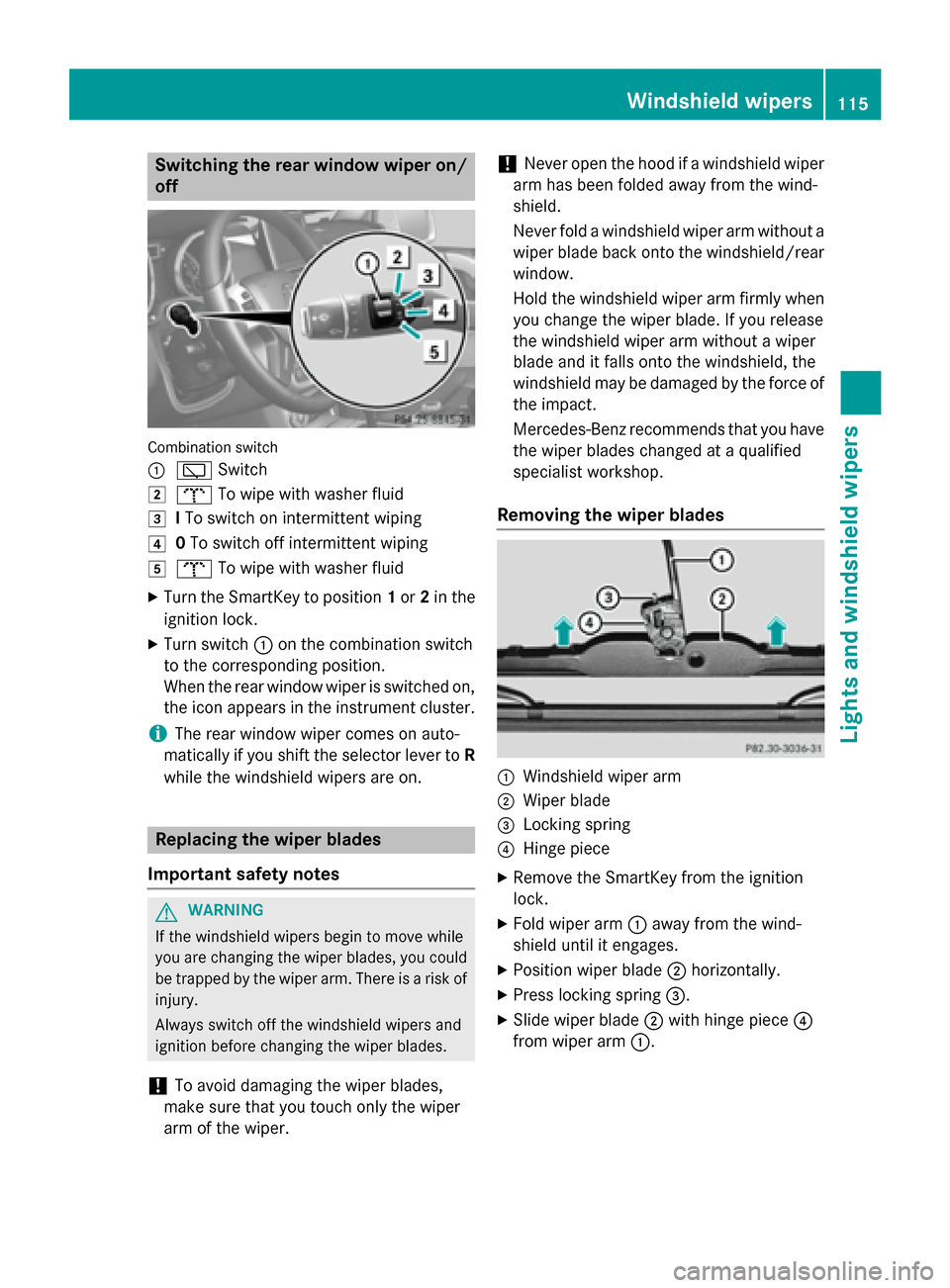
Switching the rear window wiper on/
off Combination switch
:
è Switch
2 b To wipe with washer fluid
3 ITo switch on intermittent wiping
4 0To switch off intermittent wiping
5 b To wipe with washer fluid
X Turn the SmartKey to position 1or 2in the
ignition lock.
X Turn switch :on the combination switch
to the corresponding position.
When the rear window wiper is switched on,
the icon appears in the instrument cluster.
i The rear window wiper comes on auto-
matically if you shift the selector lever to R
while the windshield wipers are on. Replacing the wiper blades
Important safety notes G
WARNING
If the windshield wipers begin to move while
you are changing the wiper blades, you could be trapped by the wiper arm. There is a risk of
injury.
Always switch off the windshield wipers and
ignition before changing the wiper blades.
! To avoid damaging the wiper blades,
make sure that you touch only the wiper
arm of the wiper. !
Never open the hood if a windshield wiper
arm has been folded away from the wind-
shield.
Never fold a windshield wiper arm without a
wiper blade back onto the windshield/rear window.
Hold the windshield wiper arm firmly whenyou change the wiper blade. If you release
the windshield wiper arm without a wiper
blade and it falls onto the windshield, the
windshield may be damaged by the force of
the impact.
Mercedes-Benz recommends that you have the wiper blades changed at a qualified
specialist workshop.
Removing the wiper blades :
Windshield wiper arm
; Wiper blade
= Locking spring
? Hinge piece
X Remove the SmartKey from the ignition
lock.
X Fold wiper arm :away from the wind-
shield until it engages.
X Position wiper blade ;horizontally.
X Press locking spring =.
X Slide wiper blade ;with hinge piece ?
from wiper arm :. Windshield wipers
115Lights and windshield wipers Z
Page 118 of 350
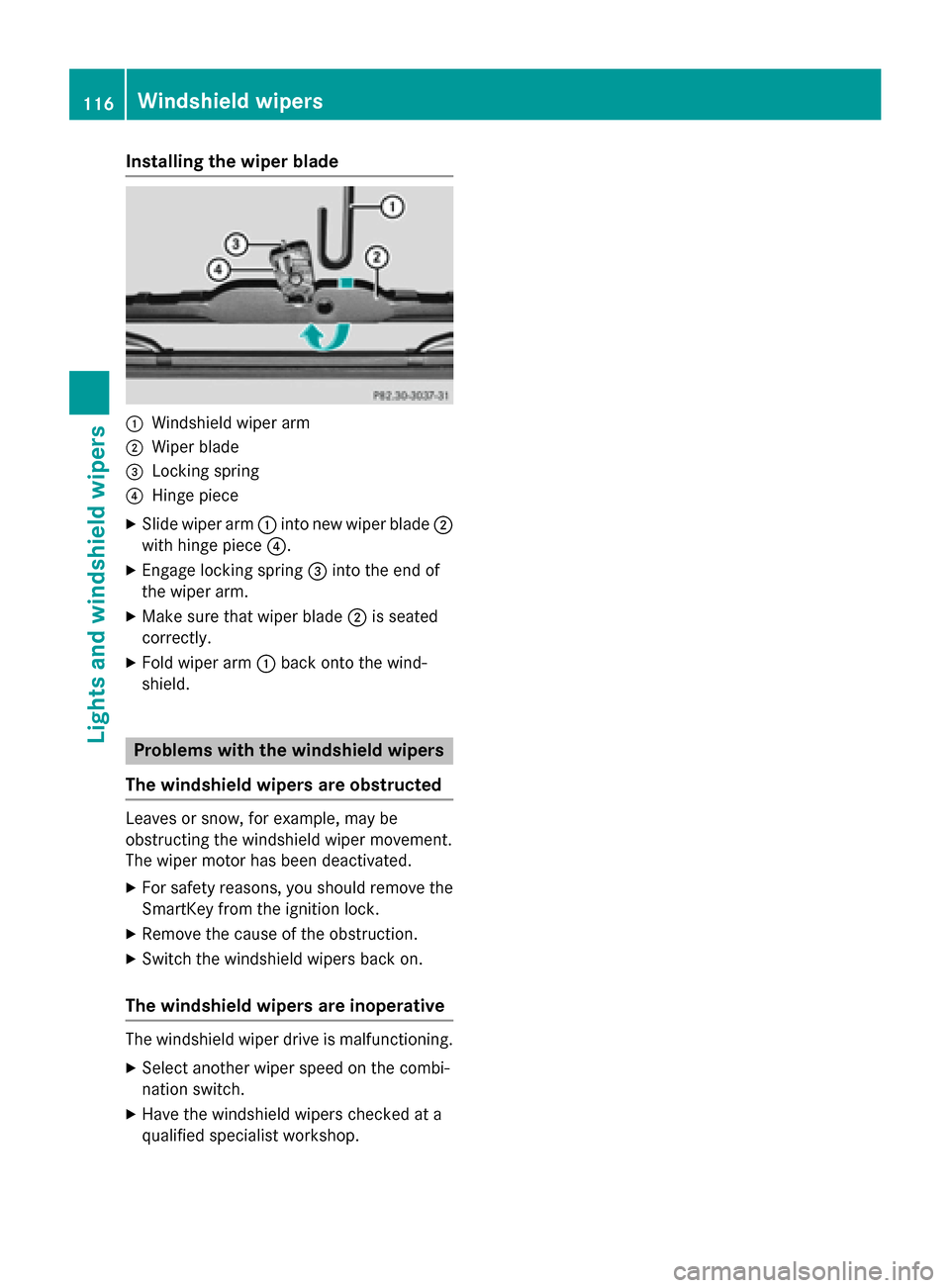
Installing the wiper blade
:
Windshield wiper arm
; Wiper blade
= Locking spring
? Hinge piece
X Slide wiper arm :into new wiper blade ;
with hinge piece ?.
X Engage locking spring =into the end of
the wiper arm.
X Make sure that wiper blade ;is seated
correctly.
X Fold wiper arm :back onto the wind-
shield. Problems with the windshield wipers
The windshield wipers are obstructed Leaves or snow, for example, may be
obstructing the windshield wiper movement.
The wiper motor has been deactivated.
X For safety reasons, you should remove the
SmartKey from the ignition lock.
X Remove the cause of the obstruction.
X Switch the windshield wipers back on.
The windshield wipers are inoperative The windshield wiper drive is malfunctioning.
X Select another wiper speed on the combi-
nation switch.
X Have the windshield wipers checked at a
qualified specialist workshop. 116
Windshield wipersLights and windshield wipers
Page 119 of 350
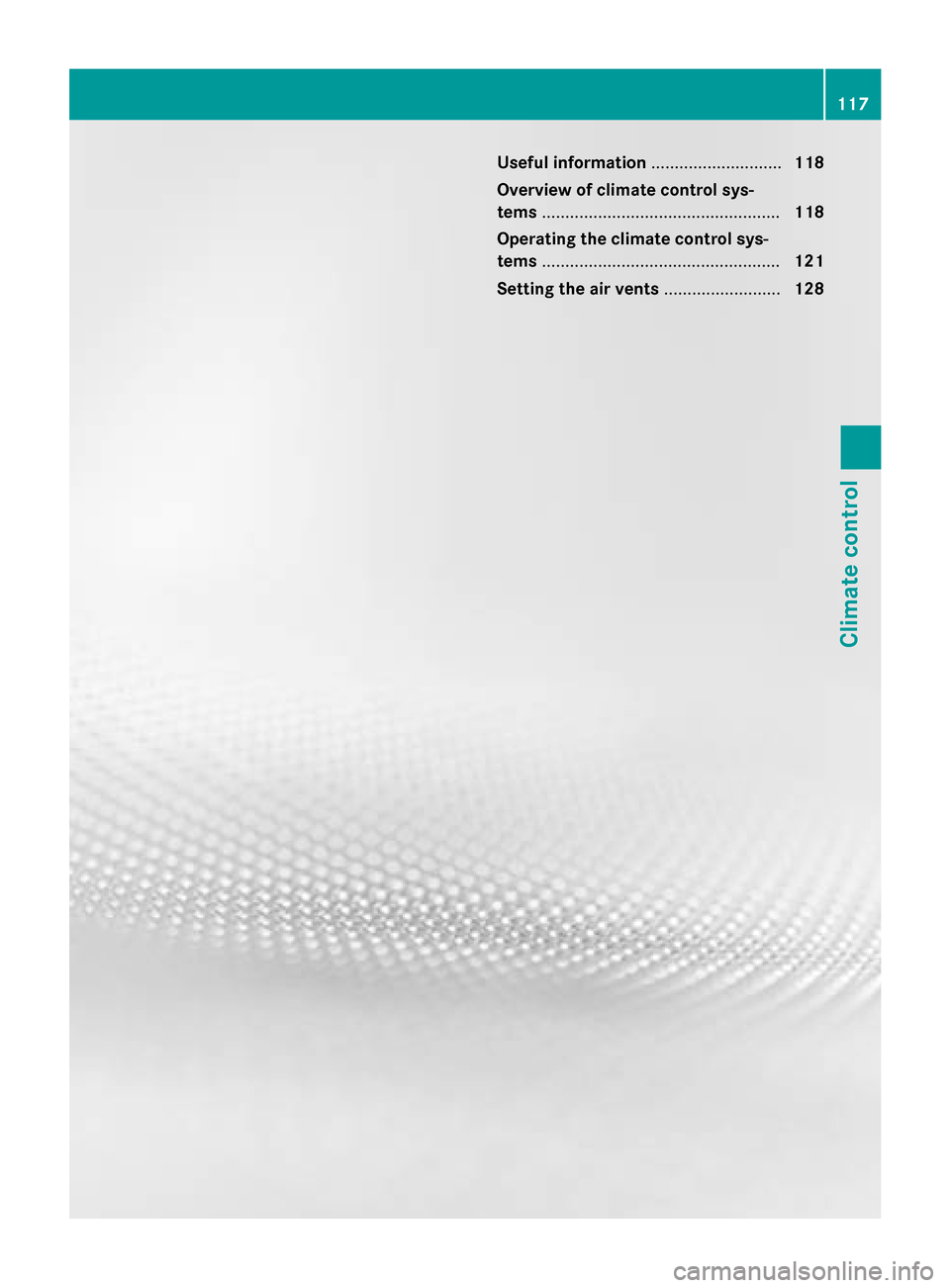
Useful information
............................118
Overview of climate control sys-
tems ................................................... 118
Operating the climate control sys-
tems ................................................... 121
Setting the air vents .........................128 117Climate control
Page 120 of 350

Useful information
i This Operator's Manual describes all
models and all standard and optional equip- ment of your vehicle available at the time of
publication of the Operator's Manual.
Country-specific differences are possible.
Please note that your vehicle may not be
equipped with all features described. This
also applies to safety-related systems and
functions.
i Read the information on qualified special-
ist workshops: (Y page 24). Overview of climate control systems
Important safety notes
Observe the settings recommended on the
following pages. The windows could other-
wise fog up. This could prevent you from
observing the traffic conditions, thereby
causing an accident.
Climate control regulates the temperature
and the humidity in the vehicle interior and
filters undesirable substances from the air.
Dual-zone automatic climate control is only
operational when the engine is running. Opti-
mum operation is only achieved if you drive
with the side windows and sliding sunroof
closed.
The climatic comfort deteriorates whilst the
sliding sunroof is open. The automatic climate control cannot maintain the set temperature
with the sliding sunroof open. You have to
adjust the climate control manually.
i The residual heat function can only be
activated or deactivated with the ignition
switched off (Y page 127).
i Ventilate the vehicle for a brief period
during warm weather, e.g. using the con-
venience opening feature (Y page 78). This
will speed up the cooling process and the
desired vehicle interior temperature will be reached more quickly. i
The integrated filter can filter out most
particles of dust, and completely filters out pollen. A clogged filter reduces the amount
of air supplied to the vehicle interior. For
this reason, you should always observe the interval for replacing the filter, which is
specified in the Maintenance Booklet. As it depends on environmental conditions, e.g. heavy air pollution, the interval may be
shorter than stated in the Maintenance
Booklet. 118
Overview of climate control systemsClimate control